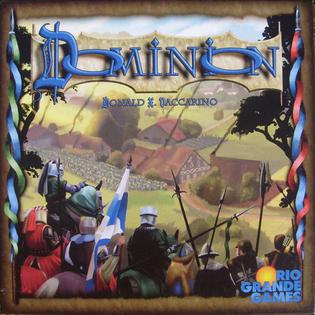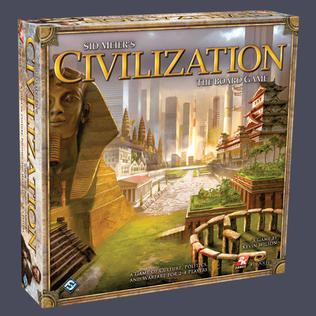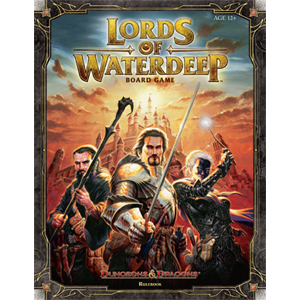
Bohnanza is a German-style card game based on the game mechanics of trading and politics, designed by Uwe Rosenberg and released in 1997 by Amigo Spiele and by Rio Grande Games. It is played with a deck of cards with comical illustrations of eleven different types of beans of varying scarcity, which the players are trying to plant and sell in order to earn money. The principal restriction is that players may only farm two or three types of beans at once, but they obtain beans of all different types randomly from the deck and so must engage in trade with the other players to be successful.

Alhambra is a 2003 tile-based German-style board game designed by Dirk Henn. It was originally published in Germany by Queen Games in a language-interdependent version; an English-specific version was released in North America by the now-defunct Überplay. The game is a Muslim-themed update, set during the construction of the Alhambra palace in 14th century Granada, of the 1998 stock trading board game Stimmt So!, which in turn was an update of the 1992 mafia influence board game Al Capone; the original version was subsequently released as Alhambra: The Card Game. Upon its release, Alhambra won numerous awards, including the Spiel des Jahres award. Its success has led to the release of numerous expansion packs and spin-off games, and is becoming Queen Games' flagship franchise.

Dune is a strategy board game set in Frank Herbert's Dune universe, published by Avalon Hill in 1979. The game was designed by Bill Eberle, Jack Kittredge and Peter Olotka. After many years out of print, the game was reissued by Gale Force Nine in 2019 in advance of the 2021 Dune film adaptation.
StarCraft: The Board Game, published by Fantasy Flight Games, is a game inspired by the 1998 computer game StarCraft. Players take control of the three distinctive races featured in the video games, the Terrans, the Protoss, or the Zerg, to engage in battle across multiple worlds in order to achieve victory. Each of the three races features a fairly different playing style. A prototype of the game was shown in BlizzCon 2007, with pre-release copies sold at Gen Con 2007 and Penny Arcade Expo 2007. It was publicly released in October 2007.

Chaotic is an out-of-print Danish collectible card game brought to the United States by Chaotic USA and 4Kids Entertainment, and distributed by TC Digital Games. It was released along with the open beta version of the online game on October 24, 2007. The card game is also featured in the animated series of the same name. As of 2014, the website is currently closed and the cards are no longer in production.
Civilization: The Card Game is a card game designed by Civilization IV lead designer Soren Johnson, based on Civilization IV. It was developed in 2006 by Firaxis Games, as a bonus in the Sid Meier's Civilization Chronicles boxed set, and is not available independently.

Dominion is a card game created by Donald X. Vaccarino and published by Rio Grande Games. Originally published in 2008, it was the first deck-building game, and inspired a genre of games building on its central mechanic. Each player begins with a small deck of cards, which they improve by purchasing cards from a common supply that varies from game to game. Cards can help the player's deck function, impede their opponents, or provide victory points. As of December 2022, fifteen expansions to the original Dominion have been released.

Age of Mythology: The Boardgame is a board game created by Glenn Drover based on the video game Age of Mythology. It was released in 2003 by Eagle Games. Up to four players may play the game, but extra parts may be purchased from Eagle Games to allow eight players to play.
Glenn Drover's Empires: The Age of Discovery is the first of the Glenn Drover's Empires board games, created by Glenn Drover.
The Rivals for Catan is an updated revision of the Catan Card Game, a card game adaptation of The Settlers of Catan. The game was released in 2010. It is a member of the Catan series of games, and is published by Kosmos in German and Mayfair Games in English. Like its predecessor, The Rivals for Catan is a two-player game. As with the Catan Adventures series of games, the theme is based on the Rebecca Gablé novel The Settlers of Catan, a novel based on the original board game.

Sid Meier's Civilization: The Board Game is a 2010 board game created by Kevin Wilson based on the Sid Meier's Civilization series of video games and published by Fantasy Flight Games. While the previous board game based on Sid Meier's Civilization, published by Eagle Games in 2002, was based on Civilization III, the 2010 version takes its primary inspiration from Civilization IV. Its expansions, Fame and Fortune and Wisdom and Warfare, also began to incorporate concepts derived from Civilization V.

Android: Netrunner is an Expandable Card Game (ECG) produced by Null Signal Games, previously by Fantasy Flight Games. It is a two-player game set in the dystopian future of the Android universe. Each game is played as a battle between a megacorporation and a hacker ("runner") in a duel to take control of data. It is based on Richard Garfield's Netrunner collectible card game, produced by Wizards of the Coast in 1996.

Lords of Waterdeep is a German-style board game designed by Peter Lee and Rodney Thompson and published by Wizards of the Coast in 2012. The game is set in Waterdeep, a fictional city in the Forgotten Realms campaign setting for the Dungeons & Dragons role-playing game. Players take the roles of the masked rulers of Waterdeep, deploying agents and hiring adventurers to complete quests and increase their influence over the city.

Splendor is a multiplayer card-based board game, designed by Marc André and illustrated by Pascal Quidault. It was published in 2014 by Space Cowboys, Asmodee. Players are gem merchants of the Renaissance, developing gem mines, transportation, and shops to accumulate prestige points. Splendor received positive reviews and received numerous awards, including winner of Golden Geek Best Family Board Game, and nominated for the Spiel des Jahres Game of the Year in 2014. The game also received a mobile application and an expansion released in 2017.

Star Realms is a card-based deck building science-fiction tabletop game, designed by Rob Dougherty and Darwin Kastle and published in 2014 by Wise Wizard Games. The game started out as a Kickstarter campaign in 2013. The goal of Star Realms is to destroy opponents by purchasing cards using "trade" points and using these cards to attack an opponent's "authority" using "combat" points. The game takes place in a distant future where different races compete to gain resources, trade and outmaneuver each other in a race to become ruler of the galaxy.

Terraforming Mars is a board game for 1 to 5 players designed by Jacob Fryxelius and published by FryxGames in 2016, and thereafter by 12 others, including Stronghold Games. In Terraforming Mars, players take the role of corporations working together to terraform the planet Mars by raising the temperature, adding oxygen to the atmosphere, covering the planet's surface with water and creating plant and animal life. The game incorporates elements of resource management, engine building, and strategic planning. Players compete to earn the most victory points, which are measured by their contribution to terraforming and to human infrastructure. These goals are achieved by collecting income and resources which allow them to play various projects, represented by cards that increase their income or resources, build infrastructure, or directly contribute to terraforming the planet. The game was received positively by fans and critics, and received numerous awards.

Century: Spice Road is a 2017 table-top strategy game designed by Emerson Matsuuchi and distributed by Plan B Games. The game is a simulation of fifteenth-century spice trading, and each player competes for points as they buy and sell spices represented by colored cubes.

Cartographers is a roll and write board game designed by Jordy Adan and published in 2019 by Thunderworks Games. It is part of the Roll Player universe. In the game, players aim to draw terrains based on drawn cards that award points based on the relevant letter cards. The game received positive reviews, and was nominated for the Kennerspiel des Jahres, but lost to The Crew. It was also runner-up to Parks for the Best Family Game of the 2019 Board Game Quests Awards. An app for solitary play was released in 2020.
Viticulture is a worker placement board game published by Stonemaier Games in 2013. The game's design was crowdfunded via a campaign on Kickstarter, with the concept of players building an Italian vineyard. Upon its release, Viticulture received praise for its engagement, but its luck was critiqued. Several expansions and reprints were later released.
Legendary: A Marvel Deck Building Game is a cooperative deck-building game for 1-5 players, released in 2012. It was designed by Devin Low and published by Upper Deck Entertainment, a division of Upper Deck Company.














